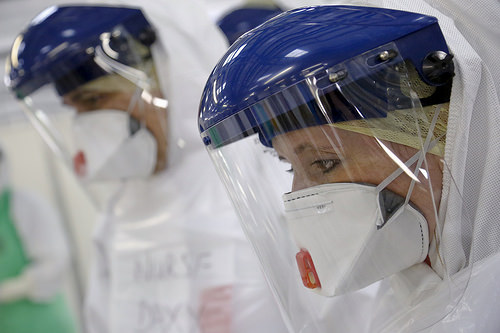Merck has produced an Ebola vaccine called rVSV-ZEBOV vaccine. On the surface, it might appear that a pharmaceutical giant has stepped up to the plate and is presenting rural African communities with a life-saving drug. We’ve called this new Ebola vaccine experimentation at its most obvious level and it seems as though now mainstream outlets are beginning to agree. In fact, news organization Al Jazeera notes in a new Op-Ed that Ebola vaccine recipients aren’t even allowed to report side-effects to research teams and some health officials are blatantly saying that discussing or disclosing side effects causes people to “lose confidence in the vaccine.”
This is truly unsettling stuff.
Merk’s rVSV-ZEBOV vaccine isn’t an approved drug (this is an essential detail). In fact, rVSV-ZEBOV vaccine is unlicensed by health authorities. While its administration would typically be considered illegal, a “compassionate use” protocol rule allows for the vaccine to be used on people outside of clinical trials. In other words, this new unapproved Ebola vaccine is being used on people in areas where Ebola is or could be, spread. Healthcare workers, people who have been in close quarters with Ebola patients, and any first responders to pandemics or outbreaks are being given this new Ebola vaccine. By the end of June, that could turn into 10,000 people being Ebola vaccinated.
The media, of course, is all for the vaccine. Again, the surface seems polished and philanthropic by design. But the reality is, the Ebola vaccine being distributed isn’t approved. It’s being used under circumstances where people are being made to feel desperate for a solution. Worse more, there is no regard for real consent. In other words, the vaccine is being distributed to the vulnerable who aren’t being properly vetted for any form of real medical consent.
As Al Jazeera notes, “research participants requires a complex negotiation under any circumstances, but the history of experimentation Pailey and others describe too often intensify community concerns and negative responses to certain medical interventions.”
How does one decline the Ebola vaccine, or can they? What defines “close contact with an Ebola sufferer?” What type of consent are these people giving the CDC or WHO?
From the same article:
Recently, I sought personal accounts from clinical trial participants in Sierra Leone, where I work as an anthropologist. During those conversations, I learned second-hand about participants’ inability to report concerning side effects of the vaccine – swollen joints and joint pain; skin lesions; and fever – to the research team.
How will those vaccinated understand their risk of infection and how will this shape their actions if the disease continues to spread? Who among close contacts will be missed through other means, if reports of Congolese communities’ evasion of health workers are true?
The inability to report side-effects to the research team is as harshly authoritarian as it gets. It also makes it seems that the Ebola vaccine maker, Merck, alongside health officials, have something to hide.
Seth Berkley, director of NGO Gavi, essentially told The Atlantic that telling people the side effects would cause people to “lose confidence in the vaccine.” Isn’t that everything we need to know?
Does trust in health officials and pharmaceutical companies carry no weight, or are we all considered to be more efficient guinea pigs when we are left in the dark about dangerous side-effects? Essentially, health officials are blatantly deciding to pass on getting our consent by not telling us about side-effects because they don’t want to undermine the sales of their product.
Photo by DFID – UK Department for International Development 


Be the first to comment on "Mainstream Media Accuses Merck Of Hiding Vaccine Side Effects"